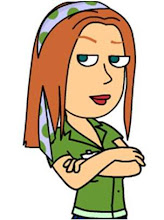Monday, November 8, 2010
Collins, Suzanne. 2010. Mockingjay. Scholastic Press: New York.
ISBN 9780439023511
In the concluding novel of the Hunger Games trilogy, Katniss finds herself a refugee in District 13, previously thought to be devoid of all life. As a survivor of two Hunger Games and devastated by the capture of Peeta, Katniss is understandably troubled by nightmares and hallucinations commonly found in post traumatic stress patients. Across the districts all out war has commenced, with 13 doing everything in their power to prosecute the war all the way to the capital, including trying to recruit Katniss to film inspiring Mockingjay propaganda videos to spur on troops. Katniss is distrustful of 13, especially Alma Coin, the president. What follows in this book is an epic sized Hunger Games on a grand scale, with Katniss being used as a pawn by both sides of the fight. In the end Katniss' troubles all seem for naught, and as a woman with everything she loved stripped from her, makes the decision to kill the new President Coin to avoid a repeat of the same society she was fighting against.
Collins has already proven that she is not afraid of depictions of violence to children in this series and that trend continues here. Interestingly she does shy away from describing in detail the sexual perversions done to Finnick, and I wonder that she included it at all since the violence of the regime was quite enough to have me against President Snow.
This past September a Booklist reviewer said that this book shows, "that war mixes all the slogans and justifications, the deceptions and plans, the causes and ideals into an unsavory stew whose taste brings madness. That there is still a human spirit yearning for good is the book's primrose of hope." Dystopian novels work well for teens because they are supposedly not yet cynical about the world, that teens still have hope. That hope in this novel seems very obscure and hard to find for me. Or perhaps it is just that Katniss, after having hope for the whole series, seems to lose it after she kills Coin. By killing Coin she's expressing one last hope that their society can and will do better. She retreats to a simple life with Peeta and takes many years of convincing to bring children into the world. I guess frankly I was disappointed that the ending was so dismal. The ending did bring to mind the "cultivate your garden" message in Voltaire's Candide.
Each chapter is packed with either heart-rending or heart-stopping action that will have teens flying through the novel in no time. Due to the graphic violence of the novel though I'd only recommend it for mature teens in 9th grade and up.
Image taken from: http://www.bookpage.com/the-book-case/wp-content/uploads/2010/02/mockingjay.jpg
ISBN 9780439023511
In the concluding novel of the Hunger Games trilogy, Katniss finds herself a refugee in District 13, previously thought to be devoid of all life. As a survivor of two Hunger Games and devastated by the capture of Peeta, Katniss is understandably troubled by nightmares and hallucinations commonly found in post traumatic stress patients. Across the districts all out war has commenced, with 13 doing everything in their power to prosecute the war all the way to the capital, including trying to recruit Katniss to film inspiring Mockingjay propaganda videos to spur on troops. Katniss is distrustful of 13, especially Alma Coin, the president. What follows in this book is an epic sized Hunger Games on a grand scale, with Katniss being used as a pawn by both sides of the fight. In the end Katniss' troubles all seem for naught, and as a woman with everything she loved stripped from her, makes the decision to kill the new President Coin to avoid a repeat of the same society she was fighting against.
Collins has already proven that she is not afraid of depictions of violence to children in this series and that trend continues here. Interestingly she does shy away from describing in detail the sexual perversions done to Finnick, and I wonder that she included it at all since the violence of the regime was quite enough to have me against President Snow.
This past September a Booklist reviewer said that this book shows, "that war mixes all the slogans and justifications, the deceptions and plans, the causes and ideals into an unsavory stew whose taste brings madness. That there is still a human spirit yearning for good is the book's primrose of hope." Dystopian novels work well for teens because they are supposedly not yet cynical about the world, that teens still have hope. That hope in this novel seems very obscure and hard to find for me. Or perhaps it is just that Katniss, after having hope for the whole series, seems to lose it after she kills Coin. By killing Coin she's expressing one last hope that their society can and will do better. She retreats to a simple life with Peeta and takes many years of convincing to bring children into the world. I guess frankly I was disappointed that the ending was so dismal. The ending did bring to mind the "cultivate your garden" message in Voltaire's Candide.
Each chapter is packed with either heart-rending or heart-stopping action that will have teens flying through the novel in no time. Due to the graphic violence of the novel though I'd only recommend it for mature teens in 9th grade and up.
Image taken from: http://www.bookpage.com/the-book-case/wp-content/uploads/2010/02/mockingjay.jpg
0 Comments:
Subscribe to:
Post Comments (Atom)








